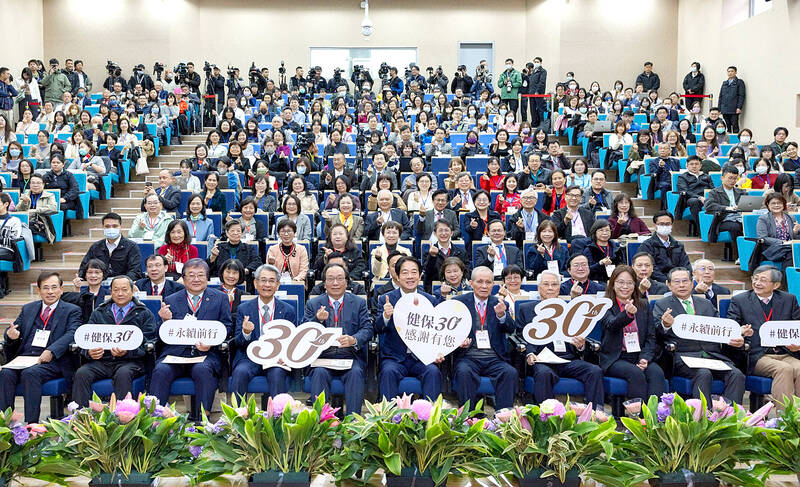President William Lai (賴清德) yesterday lauded the achievements and impact of the National Health Insurance (NHI) system ahead of the 30th anniversary of its introduction as a compulsory health insurance program.
“Thank you to the NHI system and the various functions it has served over the past 30 years — it is like a ‘guardian mountain’ that safeguards the nation, protecting everyone’s health under the system,” Lai said at a symposium held in Taipei to discuss the sustainable development of the NHI system ahead of its 30th anniversary on March 1.
Lai, a former physician, in his opening speech said that before the implementation of the NHI system, many people in Taiwan fell into a vicious cycle of illness and financial hardship, where “poverty led to illness, and illness, in turn, led to poverty,” causing widespread social problems.

Photo: screen grab from the Presidential Office’s Flickr
One example he raised was how, in the past, a single illness in a family could prevent children from continuing their education, as medical expenses consumed a significant portion of household income.
Lai said that almost all social issues caused by health-related burdens have been resolved over the past 30 years due to the NHI system, which he praised as a crucial mechanism for “social redistribution.”
“It [the NHI system] enables everyone to embrace the spirit of mutual support and insurance, while also incorporating elements of social welfare through government participation,” he said.
Noting that the NHI system currently has a coverage rate of about 99 percent, the president said: “No other country in the world has a health insurance system with such a high proportion [of coverage].”
In terms of international recognition, Lai, who has been pushing the “Healthy Taiwan” policy initiative since taking office in May last year, said that Taiwan’s healthcare system has ranked first in the world for six consecutive years, citing the Health Care Index by the online database Numbeo.
The index evaluates the overall quality of a nation’s healthcare system, including factors such as healthcare professionals, equipment, staff, doctors and costs, as shown on Numbeo’s Web site.
However, Lai acknowledged the challenges facing the NHI system, noting a current shortage of medical professionals across multiple specialties, particularly in internal medicine, surgery, pediatrics, and obstetrics and gynecology.
“If this issue remains unresolved in the long run, it will inevitably be detrimental to the public,” Lai said, without providing suggestions on how to address the problem.
In a documentary screened at the symposium, it was noted that after the COVID-19 pandemic, a considerable number of doctors opted to open private clinics or shift to aesthetic medicine, which is not covered by the NHI system and is paid for by patients themselves, to “escape the constraints” of the system.
The film highlighted that recruiting talent for certain specialties remains a challenge, particularly in fields related to life-saving medical services, such as intensive care.

INVESTIGATION: The case is the latest instance of a DPP figure being implicated in an espionage network accused of allegedly leaking information to Chinese intelligence Democratic Progressive Party (DPP) member Ho Jen-chieh (何仁傑) was detained and held incommunicado yesterday on suspicion of spying for China during his tenure as assistant to then-minister of foreign affairs Joseph Wu (吳釗燮). The Taipei District Prosecutors’ Office said Ho was implicated during its investigation into alleged spying activities by former Presidential Office consultant Wu Shang-yu (吳尚雨). Prosecutors said there is reason to believe Ho breached the National Security Act (國家安全法) by leaking classified Ministry of Foreign Affairs information to Chinese intelligence. Following interrogation, prosecutors petitioned the Taipei District Court to detain Ho, citing concerns over potential collusion or tampering of evidence. The

Seventy percent of middle and elementary schools now conduct English classes entirely in English, the Ministry of Education said, as it encourages schools nationwide to adopt this practice Minister of Education (MOE) Cheng Ying-yao (鄭英耀) is scheduled to present a report on the government’s bilingual education policy to the Legislative Yuan’s Education and Culture Committee today. The report would outline strategies aimed at expanding access to education, reducing regional disparities and improving talent cultivation. Implementation of bilingual education policies has varied across local governments, occasionally drawing public criticism. For example, some schools have required teachers of non-English subjects to pass English proficiency

‘FORM OF PROTEST’: The German Institute Taipei said it was ‘shocked’ to see Nazi symbolism used in connection with political aims as it condemned the incident Sung Chien-liang (宋建樑), who led efforts to recall Democratic Progressive Party (DPP) Legislator Lee Kun-cheng (李坤城), was released on bail of NT$80,000 yesterday amid an outcry over a Nazi armband he wore to questioning the night before. Sung arrived at the New Taipei City District Prosecutors’ Office for questioning in a recall petition forgery case on Tuesday night wearing a red armband bearing a swastika, carrying a copy of Adolf Hitler’s Mein Kampf and giving a Nazi salute. Sung left the building at 1:15am without the armband and apparently covering the book with a coat. This is a serious international scandal and Chinese

NEGOTIATIONS: The US response to the countermeasures and plans Taiwan presented has been positive, including boosting procurement and investment, the president said Taiwan is included in the first group for trade negotiations with the US, President William Lai (賴清德) said yesterday, as he seeks to shield Taiwanese exporters from a 32 percent tariff. In Washington, US Trade Representative Jamieson Greer said in an interview on Fox News on Thursday that he would speak to his Taiwanese and Israeli counterparts yesterday about tariffs after holding a long discussion with the Vietnamese earlier. US President Donald Trump on Wednesday postponed punishing levies on multiple trade partners, including Taiwan, for three months after trillions of US dollars were wiped off global markets. He has maintained a 10 percent